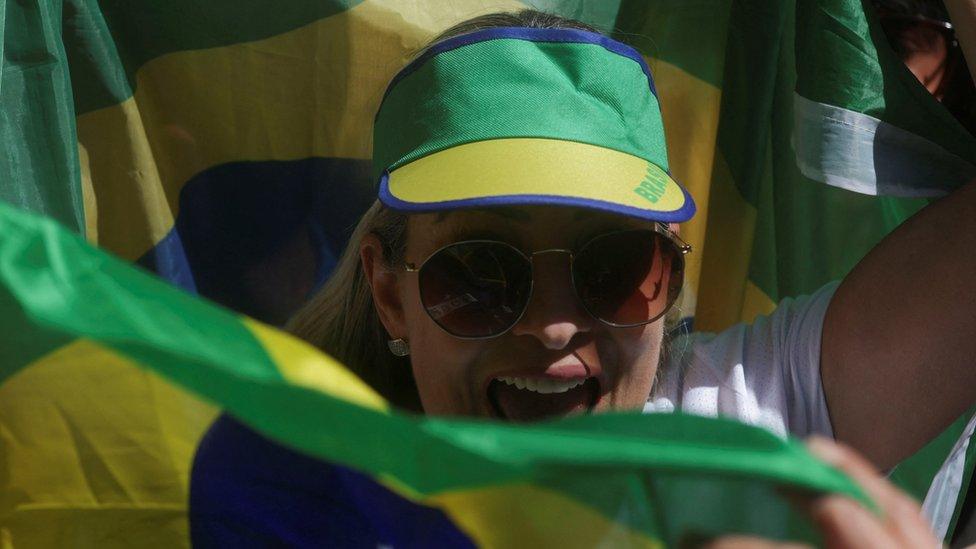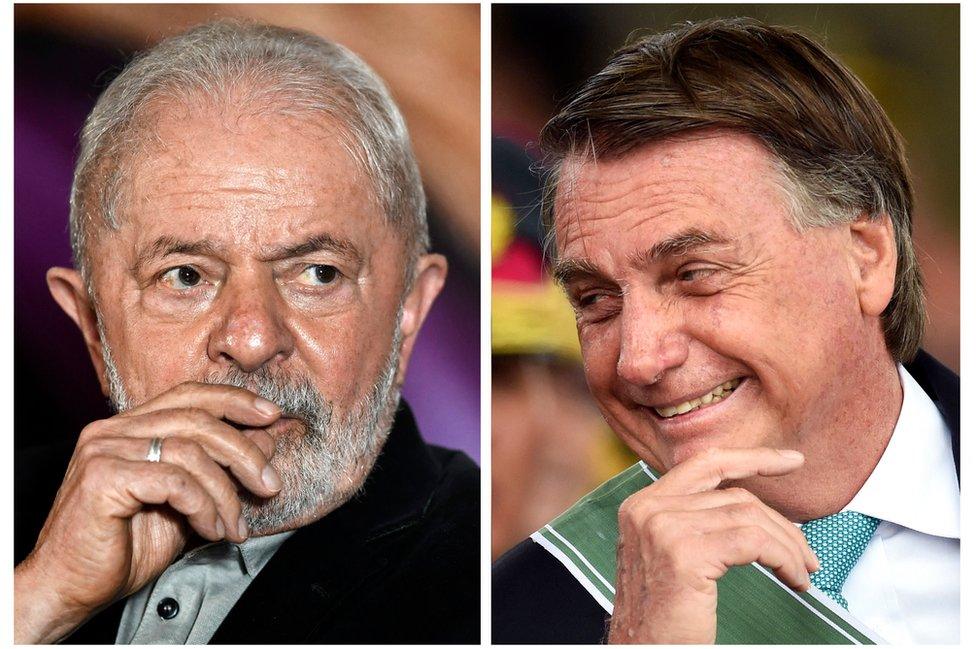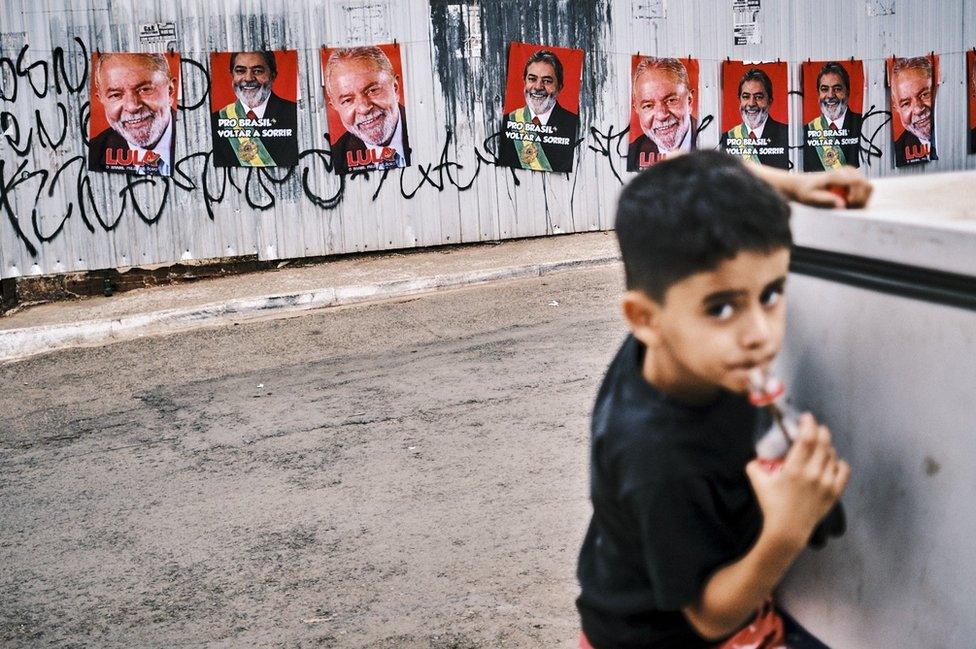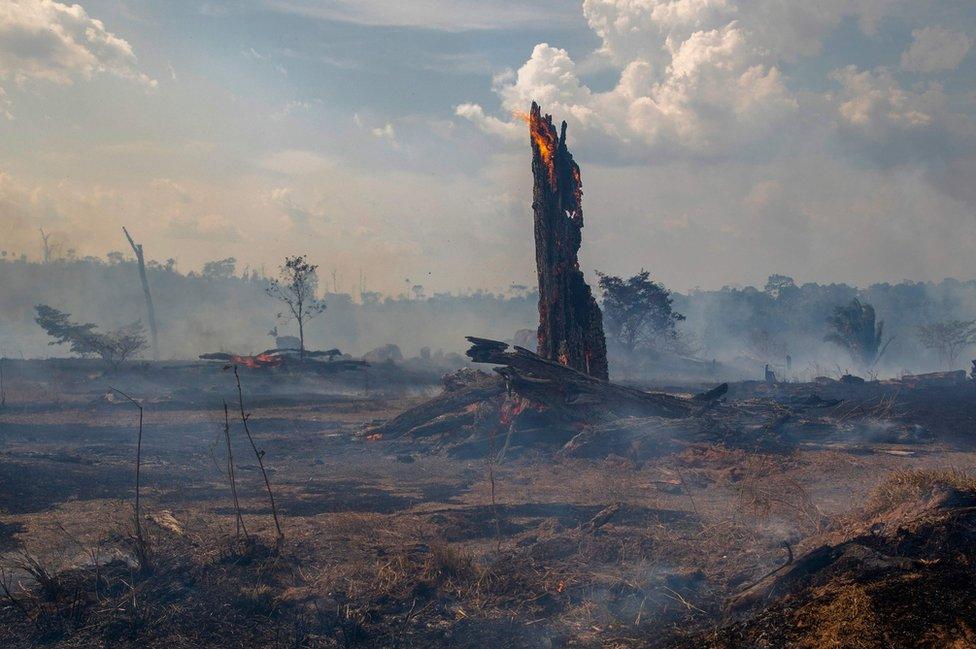Brazil election: Why it matters so much to the US
- Published

Bolsonaro supporter at a rally
In less than two weeks, one of the world's biggest democracies will hold what many are describing as its most important presidential election in years. The US has been watching this vote in Brazil closely. Why?
There aren't many issues that staunch opponents in Washington ever agree on.
But they are united on this.
"This is going to be one of the most intense and dramatic elections in the 21st Century," former Trump aide Steve Bannon tells the BBC.
"The fate of Brazil's democracy and of US relations with Brazil will be decided in the upcoming election," says Senator Patrick Leahy, one of a number of Democrats taking a strong interest in the election.
At a recent reception in Washington to mark 200 years since Brazil gained independence from Portugal, the talk was of little else.
There are several reasons why this election has grabbed the attention of the US - trade, democracy, Trump and climate change.
The fates of the two countries have felt entwined of late, as they face similar challenges and share common interests. Both endured huge death tolls in the pandemic and now face inflation levels above 8%.
There is record trade between them - aircraft, petroleum, iron and steel - and they also make similar commodities. While Brazil is the largest producer of soy and orange, followed by the US, respectively in second and fourth positions, the Americans are ahead in corn, beef, turkey and chicken production, with Brazil in second or third.
In 2021 Brazil became the country in which China invested the most, a blow to the Americans in their most obvious zone of influence in the Cold-War-like rivalry between Washington and Beijing.
So, interest in who takes power in Brazil - current President Jair Bolsonaro or former President Luiz Inácio Lula da Silva - was always going to be high. But what's different this time is the number of US officials talking publicly and privately about it, months before the vote.

Lula and Bolsonaro
"There is a greater interest and this is due to the threat of democratic rupture," says Brazilian scholar Carlos Gustavo Poggio, a specialist in Brazil-US relations and professor from Berea College in Kentucky.
The last election was peaceful, he said. "Now we have a president who does not make it very clear whether he will obey the results of the polls and who has a close relationship with the military."
Since winning the election in 2018, Bolsonaro has repeated accusations of electoral fraud without any evidence. Brazil has had electronic voting machines since 1996 - and no systematic fraud has ever been recorded.
During a recent visit to the UK to attend the funeral of Queen Elizabeth, Bolsonaro said that if he received less than 60% of the votes then "something abnormal has happened" in the electoral court responsible for counting the votes and announcing the winner. In polling, he has never surpassed 35% and is about 10 percentage points behind Lula.
On other occasions he has said he will accept the election result but some have seen in his remarks echoes of Donald Trump's false claims of fraud after his defeat to Joe Biden.
"Brazil and the United States are mirrors of each other," says former Deputy US Secretary of State Thomas Shannon, who also served as US ambassador in Brazil in the early 2010s. What happens to one of these two democracies happens to the other.

What they stand for
Lula
left-wing, former trade union leader
increase protection measures for the Amazon
eradicate hunger in the country by strengthening income transfer programmes
resume multilateral international policy and regional leadership
Bolsonaro
right-wing populist, former army captain and backbench politician
made long-awaited pension reform and promises to continue reforming the Brazilian state
vows to battle gender ideology and govern based on Christian principles
facilitate access to weapons for ordinary citizens

In a recent address to the nation, Biden was clear in saying he believed Trump's Maga [Make America Great Again] movement was a threat to democracy. And some see the strong interest in these elections in Brazil as the US confronting its own ghosts of January 6th, when Trump supporters stormed the US Capitol as Biden's election win was being certified.
In an interview with BBC Brasil, Under Secretary of State for Political Affairs, Victoria Nuland, stated that "what needs to happen in Brazil are free and fair elections, using the institutional structures that have served you [Brazilians] well in the past".
A conversation between the head of the CIA, William Burns, and Bolsonaro's aides was leaked, in which Burns asked the Brazilian president to stop casting doubts on the elections. Bolsonaro denied those words were exchanged.
US politicians have been getting involved as well. Senator Leahy joined Bernie Sanders and four other Democratic senators to introduce a resolution supporting democratic institutions in Brazil. And in the lower chamber, the House of Representatives, Democrats tried and failed to pass a measure that would suspend military aid to Brazil if the army abandoned its neutrality.
"Sometimes it's formal, other times it's leaks, but it's all trying to pass along the message and the thinking of Washington," says Nick Zimmerman, senior consultant at the Brazil Institute and former White House foreign policy assistant in the Obama administration.

He thinks it speaks to a broader international foreign policy concern of Democrats and some Republicans about global threats to democracy. "The multilateral democratic order built after World War II is at risk in a way that it hasn't been over the past 80 years. And that is something for the United States to fight for and defend."
Questioning the electoral process is not the only similarity between Trump and Bolsonaro, who is also known as "Trump of the Tropics".
Both campaigned as outsiders, promising to fight the political elites, even though Bolsonaro was steeped in politics. Both encourage nationalism and gun ownership, which in the case of Brazil has led civilians to own more weapons than the Federal Police for the first time in the recent era. Both dominate social media.
"Bolsonaro is a great hero for all of us," says Bannon, who sees Brazil as a key part of a global populist movement. "He's at the level of [conservative authoritarian Hungarian prime minister] Viktor Orban as someone that has stood for sovereignty and really grassroots. He's got evangelicals, he's got working-class people. If you look at Brazil, it is very much like the Maga movement."
At the other side of this electoral contest, requesting a second chance from the Brazilian voters, is Lula, who ended his term in 2010 as the most popular president in the country's history but has since become an increasingly divisive figure.
Under his successor, Dilma Rousseff, the country plunged into recession and Lula was investigated and convicted for a bribery scandal. The fact his conviction was later annulled has not dimmed in some people's minds his association with a corrupt elite.
Beyond the intriguing contrast between the two main candidates, and the possibility of a contested election, there is another compelling reason why Brazil is on the agenda of American and European politicians - a factor that affects people the world over.
In recent years, Brazil has accelerated the process of deforestation of the Amazon, the largest tropical forest in the world. The Bolsonaro government reduced spending to prevent the devastation of the biome. Last year, its environment minister was investigated and accused by the US of being involved in illegal logging traffic.

Amazon rainforest on fire
"It is clear the challenge of development in the Amazon and the perception that Brazil's decisions matter to the rest of the world has increased interest," says Shannon.
During his 2020 election campaign, Biden suggested that Americans should lead the creation of an international billion-dollar fund that would help Brazil pay for the preservation of the forest area. The promise, however, never got off the ground. The main reason, according to people familiar with the matter, was the lack of confidence that the Bolsonaro administration would comply.
Lula has been very vocal about his intent to protect the Amazon but he and his successor built hydroelectric dams in the middle of the Amazon, which caused serious damage to the forest and its native population.
If Lula's new greener stance pleases the US, there is much more dissatisfaction with his close relationship with the regimes of Cuba, Nicaragua and Venezuela. Lula was also a great advocate of BRICS, the bloc made up of India, Russia, China, South Africa and Brazil which some saw as a challenge to western power.
In contrast, under Bolsonaro in 2019, for the first time in history, Brazil voted in support of the US embargo on Cuba, along with the US itself and Israel, and against 187 other countries. Facing Biden, Bolsonaro would have reminded him that he works as a shield against what he calls the "spread of communism" in Latin America.
Yet over protests from the US, the Brazilian president visited President Vladimir Putin in Moscow in 2022, just two weeks before the start of the war in Ukraine.
For Shannon, regardless of who wins the election, Brazil will be a major international player, with whom the US needs to work, without any pretensions to dominate.
"The difference between Brazil and the US is that the US is a global superpower and they know it," he says. "Brazil is a superpower and it hasn't discovered it yet."